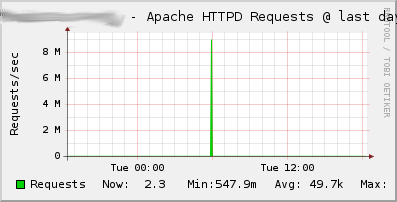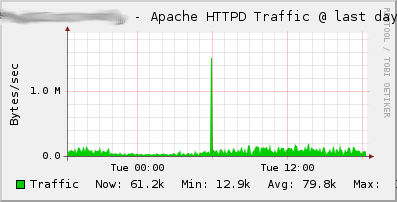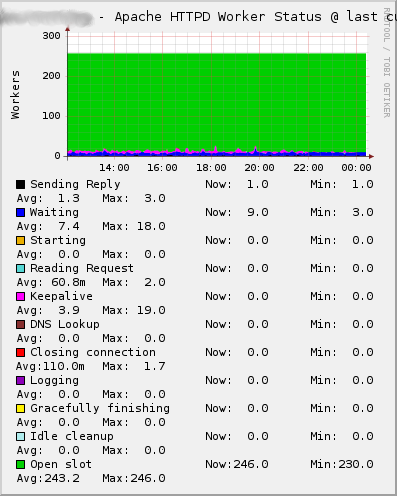2013-07-02 // AIX RPMs: AWStats, ganglia-addons-httpd, httpd and mod_perl
Following up to the previous posts, regarding the topic of AIX RPM packages, here are four new AIX RPM packages from the webserver and webserver monitoring category:
AWStats: AWStats is a open source logfile analyzer which can parse and process a number of popular logfile formats and generate graphical reports from the information gathered.
In order to run AWStats on a host, you need to edit the configuration files in
/opt/freeware/etc/awstats/according to your needs and environment. To perform regular updates on the generated statistics, a cronjob – preferably with use of the run_parts wrapper – should be set up. E.g. for an statistics update every ten minutes:8,18,28,38,48,58 * * * * /opt/freeware/libexec/run_parts/run-parts -x /opt/freeware/share/awstats/tools/update.sh
ganglia-addons-httpd: A Ganglia addon to gather performance metrics from the Apache webserver via the Apache
mod_statusmodule. The packageganglia-addons-httpd-scriptsis to be installed on the host running the Apache webserver. It depends on theganglia-addons-basepackage, specifically on the cronjob (/opt/freeware/etc/run_parts/conf.d/ganglia-addons.sh) defined by this package. In the context of this cronjob all avaliable scripts in the directory/opt/freeware/libexec/ganglia-addons/are executed. For this specific Ganglia addon, the Apache configurationmod_statusneeds to be enabled:$ a2enmod status Enabling module status. Run '/etc/rc.d/init.d/httpd restart' to activate new configuration
and the module option set to
ExtendedStatus On:- /opt/freeware/etc/httpd/mods-enabled/status.conf
<Location /server-status> SetHandler server-status Order deny,allow Deny from all Allow from 127.0.0.1 ::1 </Location> # Keep track of extended status information for each request ExtendedStatus On
After those changes the Apache processes need to be restarted:
$ apachectl -t Syntax OK $ /etc/rc.d/init.d/httpd restart
The package
ganglia-addons-httpdis to be installed on the host running the Ganglia webinterface. It contains templates for the customization of the Apache metrics within the Ganglia Web 2 interface. See theREADME.templatesfile for further installation instructions. Here are samples of the three graphs created with those Ganglia monitoring templates:httpd: A slightly modified version of Michael Perzls Apache packages. The packaging has been done in a different way, so that the different MPMs as well as their development files are part of different sub-packages, which can be installed seperately. The contents of the configuration directory
/opt/freeware/etc/httpdare modeled closer to the setup one usually finds on current Debian Linux distributions, namely with the subdirectoriesconf.d,mods-available,mods-enabled,sites-availableandsites-enabled. “mods” (modules) and “sites” are enabled by symlinking the respective files from themods-availableandsites-availabledirectories into the directoriesmods-enabledandsites-enabled. The commandsa2enmod,a2dismod,a2ensiteanda2dissiteknown from current Debian Linux environments have been added to ease the job of creating and removing the necessary symlinks.To run a at least minimal httpd setup, you need to enable some modules after installing the RPM packages:
$ for MOD in alias authz_host log_config log_io mime; do a2enmod ${MOD}; done Enabling module alias. Run '/etc/rc.d/init.d/httpd restart' to activate new configuration! Enabling module authz_host. Run '/etc/rc.d/init.d/httpd restart' to activate new configuration! Enabling module log_config. Run '/etc/rc.d/init.d/httpd restart' to activate new configuration! Enabling module log_io. Run '/etc/rc.d/init.d/httpd restart' to activate new configuration! Enabling module mime. Run '/etc/rc.d/init.d/httpd restart' to activate new configuration! $ apachectl -t Syntax OK $ /etc/rc.d/init.d/httpd start
mod_perl: Basically the same as Michael Perzls mod_perl package, but build with the IBM XL C/C++ compiler against the Perl package provided here: AIX RPMs: Perl and CPAN Perl Modules. Thus it does not need libgcc to be installed.
Leave a comment…
- E-Mail address will not be published.
- Formatting:
//italic// __underlined__
**bold**''preformatted'' - Links:
[[http://example.com]]
[[http://example.com|Link Text]] - Quotation:
> This is a quote. Don't forget the space in front of the text: "> "
- Code:
<code>This is unspecific source code</code>
<code [lang]>This is specifc [lang] code</code>
<code php><?php echo 'example'; ?></code>
Available: html, css, javascript, bash, cpp, … - Lists:
Indent your text by two spaces and use a * for
each unordered list item or a - for ordered ones.






